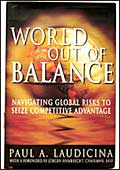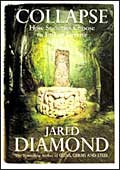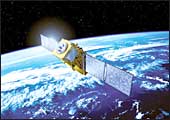|
Nail
nibblers in business tend to be the practical sort, worrying about
what's within their management domain rather than what's without.
Yet, McGraw-Hill was stormed with orders for copies of World Out
Of Balance just by virtue of those words. "There must be something
really wrong with the world if they all relate to such a title,"
says the author, Paul A. Laudicina.
As managing director of at Kearney's Global
Business Policy Council, Laudicina is an advisor on strategic risk
adaptation, and has some grim words for global businesses that have
given up charge of their destiny (evident in the blame allocation
of annual reports). "If they don't engage the world and recover
from the shellshock of the early 21st century, their inaction will
put the modern corporation more at risk than any exogenous factor
will." Big bust-ups happen, he seems to say, so wisen up. Fast.
The
author analyses such destiny drivers as globalisation, demographics,
consumer dynamics, natural resources and regulation, to generate
a matrix of future scenarios for 2015 that get crunched at the end
into three basic outlines, the least unsettling of which forecasts
a somewhat barrier-free world with China and America in mutual bipolar
comfort, the threats from rebels muzzled. The book also offers tools
to take on most risks. If it deserves a closer look, though, it's
for the details-the internet virus chart, for example, that shows
disruption time shortening to nanoseconds with the advent of 'spooky'
computers. Or the market size maps on pages 77-78 that get eyes
rubbed with their amazing absences and enlargements. China's huge
presence here, with its 701 million fat wallets in 2015, contrasts
sharply with South Asia's domination of the energy poverty map.
 |
 |
WORLD OUT OF BALANCE
By Paul A. Laudicina
McGraw-Hill
PP: 236
Price: Rs 1,232
|
COLLAPSE
By Jared Diamond
Penguin
PP: 575
Price: Rs 1,230 |
Don't miss the part on consumer behaviour. It cites David Brooks'
Bourgeouis Bohemians, C.K. Prahalad's Dharavi dare-doers and even
Carl Jung's adventurous archetypes, while gently nudging the cola
debate along. The emphasis of risk negation, by the way, is on working
out the world's motivations, as in the case of McDonald's (see One
Size Fits One) having to wonder whether it had made a fetish of
its notion of planet-friendly packaging.
If planet sensitivity has indeed started rising,
the season's shelfbuster ought to be this other book, Collapse:
How Societies Choose to Fail or Survive. For one, it is written
by UCLA professor Jared Diamond, famous for Guns, Germs And Steel
and (less so for) Why Is Sex Fun? For another, while he, like Laudicina,
begins with a prosaic sense of non-alarmist alarm, the book's narrative
turns scintillating in its focal attraction the moment Diamond turns
on the charm.
That happens once the prefaced poem begins
to explain itself, in chapter two: how the once thriving inhabitants
of Easter Islands came to commit eco-cide. "No other site that
I have visited made such a ghostly impression on me as Rano Raraku,
the quarry on Easter Islands where its famous gigantic stone statues
were carved," he begins, telling a synapse-blowing story of
doom involving deforestation and desperation, deduced from studies
of high academic credibility.
But did their own choices really do them in?
That's the discussion that follows the stunned hush each time he
sings his sweetest song to a live audience, says Diamond. And if
they did, why did they do it? This is part 4 of the book, and it
takes a good hard look at 'rational behaviour' in offering answers.
These range from simple ignorance, daily delusions and mob psychology
to collective denial, overstressed groupthink and even the myopia
of a greedy few who could gain hugely while the perils are too spread-out
and slow-acting to awaken the many who could suffer.
"Globalisation makes it impossible for
modern societies to collapse in isolation," Diamond cautions,
urging a good long-termist rethink. Now, the author is from academia.
He probably thinks 'Papua New Guinea' each time he hears 'P&G'.
But woolly-headed he is not. If anything, the book's references
to business and economics are testimony to the expanse of his intellectual
engagement. Moreover, he uses convincing arguments-including geological
evidence of volcanic ash as relevant to greenery-to shape his viewpoint
on whether it's a matter of free will or not. It is.
-Aresh Shirali
 |
BEST FACE FORWARD
By Jeffrey
F. Rayport & Bernard J. Jaworksi
Harvard Business School Press
PP: 262
Price: Rs 1,318 |
How many times
have you ended up buying that second or third shirt, or even a costlier
television set, that you could have done perfectly without? Possibly
more than once. And if you ever sat down to examine why, it would
emerge that it was due to that charming sales girl you couldn't
say no to. Marketers know this only too well, which is why they
have that pretty face and/or knowledgeable soul at the front office.
The problem, however, is that you can count on your fingers the
number of such gifted sales people available in the job market.
More often than not, the people at sales counters have either "started
on the job yesterday" or "will have to speak to the supervisor"
about an in-between size in a different colour. At worst, they've
been on the job long enough and also know stuff, but they just don't
care about customers. Situations that all shoppers are only too
familiar with.
So must marketers be eternally at the mercy
of luck or whimsical sales staff? No, say Rayport and Jaworski,
just re-engineer your front office. According to them, the point
of company-customer interface is becoming "the new frontier
of competitive advantage", and companies must compete on this
front by rethinking their choice of interface: human or machine,
or a blend of both. As with other such books, the authors reinforce
their arguments with real life examples. While the book isn't as
"visionary and compelling" as its jacket makes it out
to be, it does leave the reader with an important realisation, which
is that different points of company-customer interaction need different
'faces'. A machine-alone or person-alone interface strategy may
be the worst.
-R. Sridharan
|







